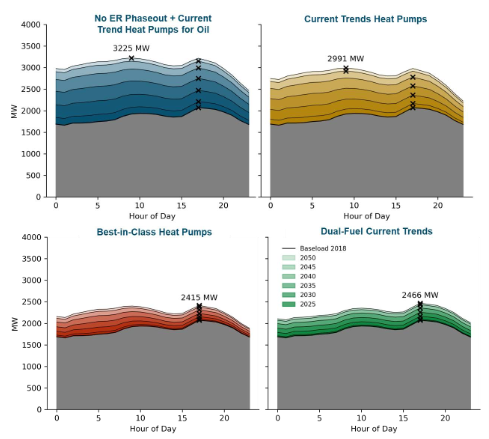
Nova Scotia Power operates in a province committed to Net Zero, and studies of Nova Scotia, like those across North America, emphasize that electrification will be critical to decarbonization. Electrification has the potential to provide significant benefits to Nova Scotians by reducing total energy expenditures and lowering the province’s overall emissions footprint, but realizing the full benefits of electrification will require transformation of how energy is used. In Nova Scotia, Nova Scotia Power plans, operates, maintains, and balances the majority of the grid assets needed to power widespread electrification and therefore is well positioned to proactively identify and support initiatives to advance electrification. In a new study published this month by Nova Scotia Power, E3 analyzed the costs and benefits of electrification in the province and the key actions the utility may take in supporting the transformation.
Specifically, the study goals included:
- Jurisdictional Scan: What role is electrification playing in helping jurisdictions across North America make progress toward Net-Zero?
- Economics: What are the benefits and costs of adopting key electrified technologies—electric vehicles and heat pumps for this study—from the perspective of adopters, ratepayers, and the province?
- Utility Planning & Program Recommendations: What are the aggregate impacts of electrification on Nova Scotia Power’s electricity sales and peak demands over time, and how should the utility proactively plan for these to minimize the cost of serving new electrification loads? What program design elements should Nova Scotia Power, or partners, put in place to encourage and enable beneficial electrification in the near term?
In the key findings from the Nova Scotia electrification study, E3 finds that transportation and building electrification reduce emissions in Nova Scotia. Transportation electrification investments produce society-wide benefits for Nova Scotians, with most investments having benefits exceeding costs from the perspective of EV drivers, utility ratepayers and society. Building electrification also yields net benefits for the province, however unmanaged heat pump adoption could lead to significant increases in Nova Scotia Power’s peak load, requiring new investments in generation, transmission, and distribution capacity to serve the new load and reducing societal benefits. These impacts can be mitigated by adoption of dual fuel hybrid (mini-split) systems and best-in-class performing heat pumps, but this reduces consumer benefits. It will be important to develop policies and programs to encourage adoption of these alternative technologies. Pro-active engagement by Nova Scotia Power in managing transportation loads and encouraging adoption of advanced building technologies will be crucial for minimizing costs and mitigating grid impacts.
E3 concluded its study with a series of recommendations for Nova Scotia Power. Those recommendations included the design and promotion of increasingly dynamic rate structures, collaboration with the energy efficiency provider to provide rebates on electrification equipment, and support for development of infrastructure “backbone” for electric vehicle charging. Other recommendations encourage the utility to pursue cost-effective grid modernization, incorporation of electrification analysis into utility planning, advance distribution planning, coordination, and a focus on lower income or disadvantaged communities. These recommendations are aimed at achieving a combination of affordability, adoption, equity, and manageable grid impacts.

You can read the report on E3’s website.


